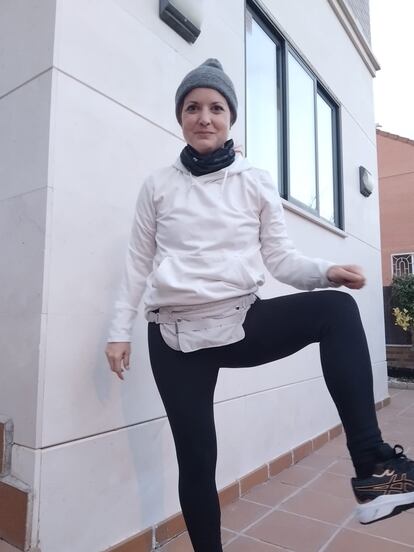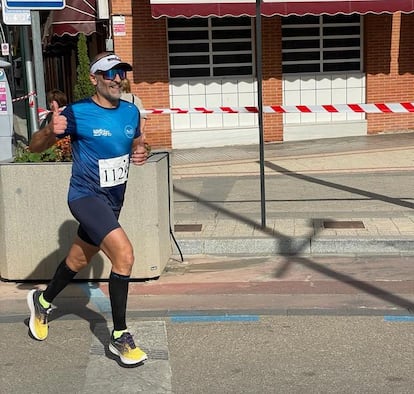What do you think about when you run?
There are those who start running and start thinking, and those who focus only on the race and nothing else. Psychology explains the whys and wherefores

I want to start by asking you a question. When you go for a run, do you do it to think or not to think? Maybe you have never thought about it but, if you ask your running friends, you will find that their answers are very varied. For example, I take advantage of the time I run to think about a lot of things, even work. But this is not the case for everyone. I have talked to several amateur runners of different levels and ages, and I have been surprised by how varied their answers are regarding what goes on in their heads when they run.
“Although the first thing I get when I go for a run is a feeling of switching off, over time I have realized that running helps me think better,” Carlos Carrasco, a 32-year-old runner from the Myrmidons athletics club, tells me. “Now I take advantage of this time to revisit issues that are bothering me. The shame is that, since I normally go for a run after work during the week, the inertia of the day unintentionally leads me to think about work. And usually I arrive home with solutions to problems or with the desire to take some initiative.”

Something very similar to what Carlos says happens to me, but there are very different cases. I also asked my colleague in EL PAÍS Alejandra Agudo. The 41-year-old started running last July, and got hooked. Now she reflects on it on her Instagram @una_corriente. Like any good journalist, she wanted to see for herself what was going through her head when she ran. She went out for 40 minutes and then wrote me this:
“Not thinking is impossible, but I don’t usually think about work issues or the problems I may be ruminating on, but rather about everything for which work and the stresses of daily life do not leave mental space for the rest of the day. And so I switch off from certain obligations and connect with other aspects of life, such as the landscape, breathing to the back of my lungs, and the movement of my legs and arms, music if I am listening to music, or the sounds that surround me first thing in the morning or at night.”

Jimena Ruiz, who is also a member of the Myrmidons athletics club, and Carlos Carrasco’s partner, is also a long-distance fan. She says that “during the first half of the long runs I make an effort to think and distract myself, because if not, I know the run will seem very long. In the second half, I try to focus only on running.”
Juan Díaz is 47 years old and a member of the Hellín Triathlon Club in Albacete (Spain). He told me something similar: “When I am not preparing for a race I run for the simple pleasure of running and to clear my head,” he explains. “In fact, I notice how it relaxes me and helps me unwind. When I’m preparing for a race, I usually think about issues related to running, such as the training I’m doing or the upcoming competition. But I don’t usually think about day-to-day issues.”

Even Haruki Murakami, who has 0 Nobel Prizes but thousands of miles of running under his belt, reflected on this topic in his essay What I Talk About When I Talk About Running, in which he wrote: “As I run I tell myself to think of a river. And clouds. But essentially I’m thinking of not a thing. All I do is keep on running in my own cozy, homemade void, my own nostalgic silence. And this is a pretty wonderful thing. No matter what anybody else says.”
Runners who think and runners who don’t
But why are there runners who start running and automatically start thinking and runners who focus only on running and decompressing? “We have the answer in their previous learning, and in repeated intentionality over many training sessions,” explain by email Natalia Pedrajas, a psychologist and doctor in healthy lifestyles, and Carla Rodríguez, a psychologist who specializes in emotions in sports. “Whether exercise in your life has been a time to switch on or off does not depend on whether we have different brains, but on how we have configured what is done in our ‘running time.’” According to specialists, the predisposition to one state or another depends on different factors:
- The reason why we are doing sports.
- The personal state in which we find ourselves.
- Previous experience in sports (“an experienced athlete who goes out to play sports will find it easier lose themselves in thought and switch off from external demands and bodily sensations,” they say).
Although we generally do not do it consciously, psychologists have given me some guidelines so that ‘reflective runners’ can switch off and vice versa:
- “First we have to ask ourselves, do we have other ways or spaces in our lives to think? If we don’t, then running is possibly a good time to do it, since mindless physical exercise (when you do not have to think about what you are doing, you simply run automatically and do not think about how you are running) manages to free up a space in our brain. It is perfect for the hippocampus to focus on what it does best, which is evoking memories and consolidating them.”
- “Running through a familiar environment, or going out with a topic in mind that we want to think about while we move, encourages us to think. If what we want is to focus on the race, we must consciously work on bringing our attention to specific aspects of it, at variance from the outside (sounds, colors, time, people, environment, etc.) to our bodily sensations of breathing, heartbeat, feeling in the muscles, position of our body, etc. It is important to alternate because we will not be able to maintain attention on some elements for a long time without starting to get lost, at which point our alternative thoughts and self-dialogue can come into action.”
And you, are you one of those who run to think or to unwind? What do you think about when you run? Do you have any recurring thoughts? If you want, let me know at pcanto@elpais.es.
Sign up for our weekly newsletter to get more English-language news coverage from EL PAÍS USA Edition
Tu suscripción se está usando en otro dispositivo
¿Quieres añadir otro usuario a tu suscripción?
Si continúas leyendo en este dispositivo, no se podrá leer en el otro.
FlechaTu suscripción se está usando en otro dispositivo y solo puedes acceder a EL PAÍS desde un dispositivo a la vez.
Si quieres compartir tu cuenta, cambia tu suscripción a la modalidad Premium, así podrás añadir otro usuario. Cada uno accederá con su propia cuenta de email, lo que os permitirá personalizar vuestra experiencia en EL PAÍS.
¿Tienes una suscripción de empresa? Accede aquí para contratar más cuentas.
En el caso de no saber quién está usando tu cuenta, te recomendamos cambiar tu contraseña aquí.
Si decides continuar compartiendo tu cuenta, este mensaje se mostrará en tu dispositivo y en el de la otra persona que está usando tu cuenta de forma indefinida, afectando a tu experiencia de lectura. Puedes consultar aquí los términos y condiciones de la suscripción digital.









































